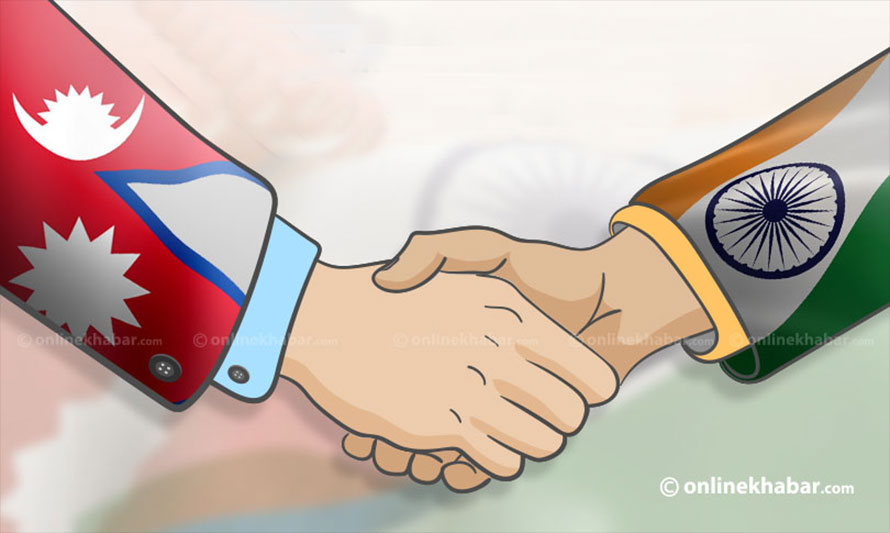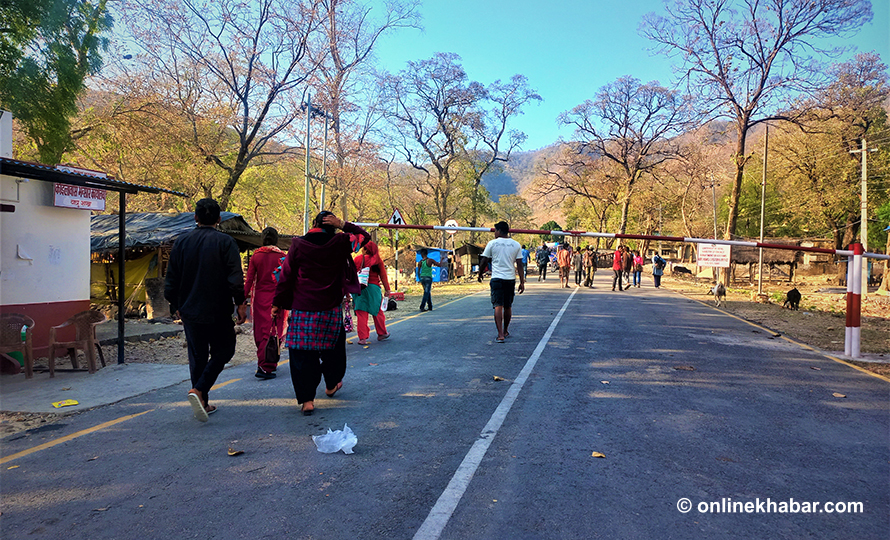
After India issued a new map covering Nepal’s Kalapani region last year, Nepal protested and sent a note demanding a diplomatic dialogue for the solution to the problem. But, India showed no interest in discussing the issue. After India inaugurated a road in the area earlier this year, Nepal, however, issued a new map that included the disputed region.
Since then, there has been a lack of communication between the two neighbours. But, on India’s Independence Day last Saturday, Prime Minister KP Sharma Oli had a phone conversation with his Indian counterpart Narendra Modi and discussions were held on the development of the two countries.
Experts in diplomatic affairs believe that the lack of communication has ended with a brief conversation. But, will there be a dialogue between Nepal and India on the border issue anytime soon? This is what former Foreign Affairs Minister Bhekh Bahadur Thapa has to say:
How do you analyse current relationships between the two countries?
The two countries were in a state of noncommunication for a long time. Where did it start? When India published a new map to accommodate the latest development of Jammu and Kashmir, it also included the territory that it had admitted as disputed. It did so while the dialogue was going on. The conclusion reached by India without any dialogue on the disputed land put Nepal in an awkward position.
After Nepal called for a solution through the diplomatic process and India did not respond, Nepal also drew up a new map to claim its ownership of the territory. We had entered a kind of worrying situation since. But, having close ties, there was no hindrance in trade, travel and social relations between the two countries.
Can the recent phone conversation between the two prime ministers and the discussion between the two countries on development issues be understood as a beginning of the dialogue again?
Complaints of delays in Indian aid projects before the lack-of-communication situation came to the fore from Nepal’s side. To address this, an annual meeting was convened to review by Nepal’s foreign secretary and India’s ambassador. Monday’s meeting can be taken as a sign that the countries have entered the dialogue as there had been no recent formal meeting and dialogue before.
The phone conversation between the prime ministers on the occasion of India’s Independence Day not only broke the deadlock but also gave the impression that the problems could be resolved through dialogue.
Nepal seems to have continuously emphasised a dialogue. In this situation, did we fail or did India fail?
It is India which failed first. The two countries were constantly trying to resolve the issue from technical, administrative, diplomatic, and political levels. A joint committee had declared Kalapani and Susta as disputed regions.
Nepal felt cornered after India drew a map including the same territory. The only way we could counteract was to seize control of our territory. That is all Nepal has done.
But, instead of continuing the dialogue, the two countries reached a state of noncommunication. The bases of dialogue at the diplomatic level are still unanswered. But, no matter how embarrassing the problem may be, the search for a solution is not through other means than dialogue.
But, did not the unacceptance of the EPG report for two years show that India’s attitude towards Nepal is not positive?
This is not to say that the EPG report has been accepted, but it is certainly being delayed. I (who led Nepal in the EPG) am still in dialogue with Bhagat Singh Koshyari (who led India in the EPG), and we have not given up hope.
The EPG report is not a unilateral report. This includes not only Nepal’s grievances but also those of India. This is perhaps the first time that both Nepal and India have prepared a joint report and suggested a solution to the problem. As the coordinator of the Nepali side, what I can say is that whether the joint report is accepted or rejected, it is difficult to improve the relations without addressing the issues raised by it.
Prime Minister Modi talks about the ‘Neighbours First’ policy, but his relations with neighbours, not only Nepal, have soured. Do you think Modi is under pressure now?
Indian media have raised voices that relations with neighbours should improve. However, I do not want to say anything about India’s stubbornness. But, the idea of improving relations with Nepal has been raised in India time and again.
Prime Minister Modi’s address to the Constituent Assembly when he came to Nepal in 2014 was, in a way, an opportunity for us to change the relations between the two countries. But, then, there was the 2015 trade embargo. Even now, there has been a state of noncommunication for a long time.
But, it can’t last very long. The signs now are that both are unwilling to go through the ordeal. The beginning of dialogue at the highest level of the prime ministers is an important opportunity.
In Nepal, a popular opinion is that the solution to the problem should be found at the political level, but it is not happening. Why?
Democracy came to Nepal around the time of India’s independence. India has a long history of trying to amend a number of provisions since the 1950 treaty to give a new dimension to the concept that was inspired when it established relations with Nepal. I remember, after the political change in India, Lal Bahadur Shastri came after Jawaharlal Nehru. He also said that it was his priority to have good relations with the neighbours, but he could not implement it.
With the advent of Indira Gandhi, it felt India had somehow returned to traditional thinking. After that, IK Gujral said that he would treat the neighbours differently, but he did not last long. Then, we entered an awkward situation when the process of moving the old treaty into a retrograde direction began under Rajiv Gandhi.
It remains to be seen whether the views that Modiji has expressed in recent times to create a new situation will be positive or not. But, looking at the ups and downs in between, it can be said that India has endorsed a traditional notion of oppressing and keeping neighbours under surveillance in the name of stability and security concerns. Addressing that could also involve intellectual practices, informing people through the media and entering the political arena. Nepal has never left its place in that.
But often, Nepal’s leadership tries to follow ‘hasty diplomacy’ making light remarks about serious issues, isn’t it?
The concept of national security should be universally accepted, and there should be a diplomatic dialogue and cooperation to reach a conclusion. We are not yet mature in this. Due to that, there has been an uproar from time to time; different ideas of different parties have come up.
Looking from the outside world, Nepal is still lagging behind in the process of bringing maturity in the practice of sitting together and protecting the interests of the nation, not going back and forth on basic issues.
























